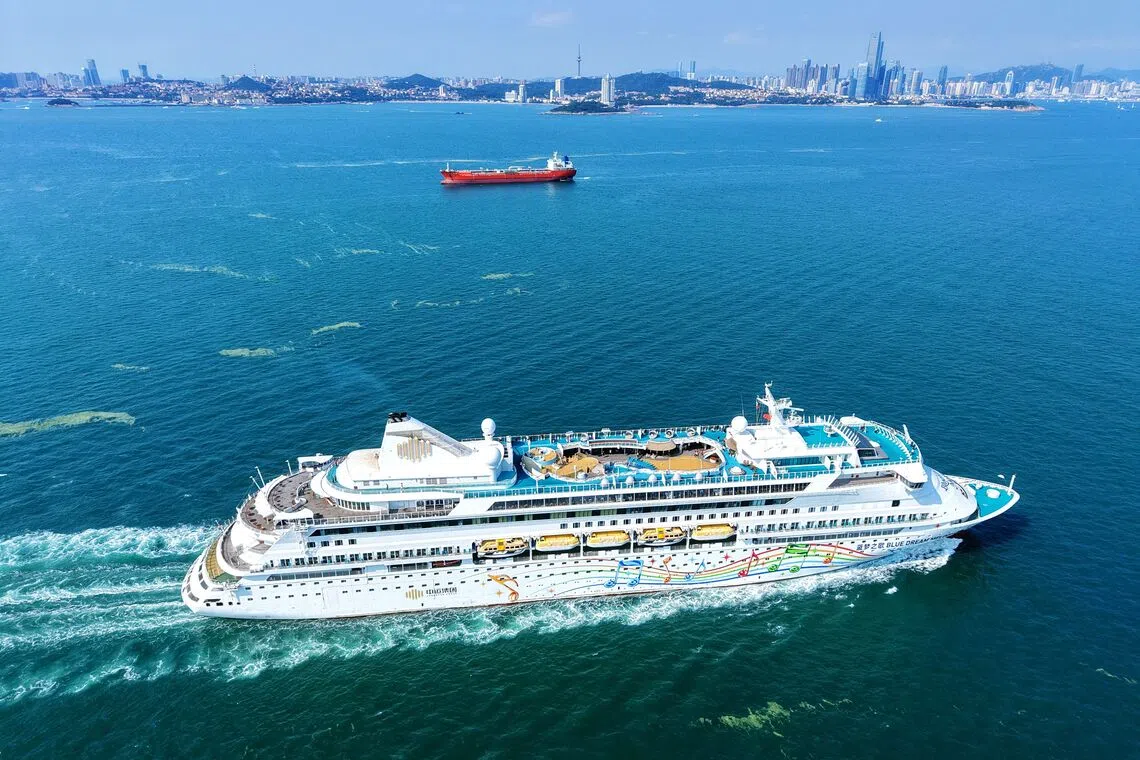Chinese cruise ships look to steer clear of Japan amid diplomatic dispute
Sign up now: Get ST's newsletters delivered to your inbox

Tour and port agents said tensions, sparked by recent remarks from new Japanese Prime Minister Sanae Takaichi, could cause Chinese tourists to be redirected to South Korea from Japan.
PHOTO: REUTERS
Follow topic:
SEOUL – Chinese cruise operators are scrambling to avoid Japanese ports as Beijing and Tokyo engage in a diplomatic dispute, which is expected to spur demand for tourism in South Korea, according to sources and cruise schedules reviewed by Reuters.
Tour and port agents said tensions, sparked by recent remarks from new Japanese Prime Minister Sanae Takaichi
Earlier in November, Ms Takaichi told Japanese lawmakers that a Chinese attack on Taiwan threatening Japan’s survival could trigger a military response.
Adora Magic City – a Chinese cruise ship that travels to Japan and South Korea’s touristy island of Jeju – has changed its schedule for December to avoid stopping at the Japanese ports of Fukuoka, Sasebo and Nagasaki as planned, according to a notice posted on the government website of South Korea’s Jeju province.
The cruise ship would instead spend between 31 and 57 hours in Jeju, longer than its usual schedule of nine hours, the notice said.
An official from Jeju province said the cruise operator requested a change in schedule without providing a reason.
“We suspect that’s because of China-Japan relations,” said the official, who declined to be identified as he was not authorised to speak to the media. “It seems like they are drafting a Plan B.”
Adora Cruises did not respond to a request for comment.
Japan has been counting the cost of the diplomatic dispute, with Tokyo-based tour operator East Japan International Travel Service saying this week that it had lost 80 per cent of its bookings for the remainder of the year.
Mr Lee Yong-gun, chief executive of South Korean port agent Eastern Shipping, told Reuters that other Chinese cruise lines were also in talks to reroute.
“If the China-Japan relationship further deteriorates and China excludes Japan’s products, culture and tourism, I expect Korea should benefit from that,” he said.
The operator of the Dream cruise ship, which departs from the Chinese city of Tianjin, wanted to avoid Japan and reroute to a South Korean port in Incheon or Busan over the next couple of weeks, but there was not enough time to change itineraries, he said, citing a discussion with the ship’s operator.
Tianjin Orient International Cruise Line, which operates the vessel, did not respond to a request for comment.
Details of cruise liners skipping Japan and staying longer in South Korea or considering doing so due to the diplomatic dispute have not been previously reported.
South Korea has emerged as the top destination for Chinese travellers in terms of the volume of international flight tickets booked over the weekend of Nov 15 and 16, according to data from online travel agency Qunar.
Scores of Chinese airlines have offered refunds on routes to Japan, a move that is expected to boost air travel to South Korea.
An executive at Jeju Air said the South Korean budget carrier is anticipating an increase in Chinese tourists, although there had been no immediate impact.
On Nov 19, the chief executive of a South Korean tour agency for Chinese travellers said he received an inquiry from a client asking whether an event – originally planned for Japan in early 2026 – could be moved to South Korea instead.
“South Korea will clearly benefit from the dispute,” he told Reuters. “But we are in a wait-and-see mode for now,” he said, asking not to be identified because of the sensitivity of the matter.
In 2013, South Korea experienced a jump of more than 50 per cent in the number of Chinese tourists it welcomed due to a territorial dispute between Beijing and Tokyo over some islands.
While Beijing’s advisory against travel to Japan has hit the country’s tourism-related stocks
Lotte Tour Development, which operates a hotel and a casino on Jeju island, has risen more than 20 per cent; travel agency Yellow Balloon Tour is up 24 per cent; and department store operator Shinsegae has gained 6 per cent on hopes that Chinese travellers will redirect to South Korea.
Some in the travel industry said it could take time before there is an uptick in Chinese tourists in South Korea.
“It (the diplomatic dispute) just happened a few days ago, so it might take time to see an increase in Chinese tourists coming to Korea, but we expect that to happen,” said Mr Kim Seol-yeong, an official at Huaqing Group, a Jeju-based tour operator for Chinese cruise tourists.
Ms Luna Wang, a 34-year-old from Hangzhou in China, said she had been thinking about travelling to Japan again in 2025 but may now opt for South Korea instead.
“Now it seems like Japan is not safe for Chinese people to travel... I guess the only good option is to go to Korea,” she said.
The founder of Chinese firm Moment Travel in Chengdu noted a dramatic change in perceptions about travelling to Japan. “The feeling now is that whoever goes is a traitor,” founder Su Shu said. REUTERS

